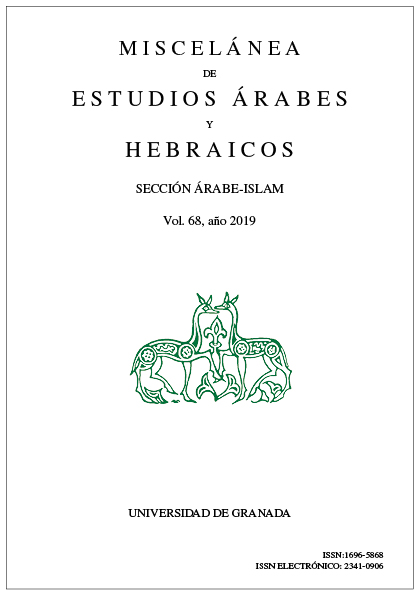Memorias acústicas palestino-chilenas: el caso de "Palestina por siempre"
DOI:
https://doi.org/10.30827/meaharabe.v68i0.1009Palabras clave:
Palestinos, Inmigrantes, Chile, Memoria, Medios de comunicación, RadioResumen
La comunidad de inmigrantes palestinos en Chile se considera la más grande e influyente de toda la diáspora palestina fuera del Oriente Medio. A medida que se consoli- daba la integración de esa comunidad en Chile, crecía su necesidad por preservar sus ras- gos identitarios y por (re)-construir su memoria. Los medios de comunicación textuales, visuales y acústicos eran medidas ejemplares para conseguir este fin. Teniendo todo ello en cuenta, este estudio se centra en un área hasta la fecha menos estudiada, cual es los programas radiales palestino-chilenos, para examinar cómo han incidido en la (re)construcción de la memoria de los inmigrantes palestinos en Chile. A fin de estudiar esta área, este ensayo examina esos programas dentro del contexto de los medios de comunicación acústicos tanto en Palestina como en Chile. Este contexto facilita que este estudio llegue a concluir que ese cultivo del espacio acústico reflejó el compromiso de los inmi- grantes palestinos por integrarse en la sociedad de acogida tanto como por preservar su herencia cultural y devoción por la tierra de los ancestros, es decir, Palestina.
Descargas
Descargas
Publicado
Cómo citar
Número
Sección
Licencia
Los autores que publican en esta revista están de acuerdo con los siguientes términos:
1. Los autores conservan los derechos de autor y garantizan a la revista el derecho de ser la primera publicación del trabajo al igual que licenciado bajo una Creative Commons Attribution License que permite a otros compartir el trabajo con un reconocimiento de la autoría del trabajo y la publicación inicial en esta revista.
2. Los autores pueden establecer por separado acuerdos adicionales para la distribución no exclusiva de la versión de la obra publicada en la revista (por ejemplo, situarlo en un repositorio institucional o publicarlo en un libro), con un reconocimiento de su publicación inicial en esta revista.
3. Se permite y se anima a los autores a difundir electrónicamente (por ejemplo, en repositorios institucionales o en su propio sitio web) la versión publicada de sus trabajos (versión post-print del editor) o, en su defecto, el de la versión post-print del autor ya evaluada y aceptada. Esto puede dar lugar a intercambios productivos, así como a una citación más temprana y mayor de los trabajos publicados (Véase The Effect of Open Access).
4. La revista no se hace responsable de las opiniones vertidas por los autores.















